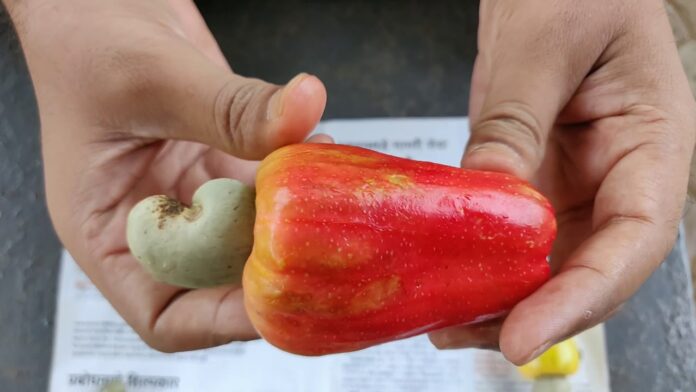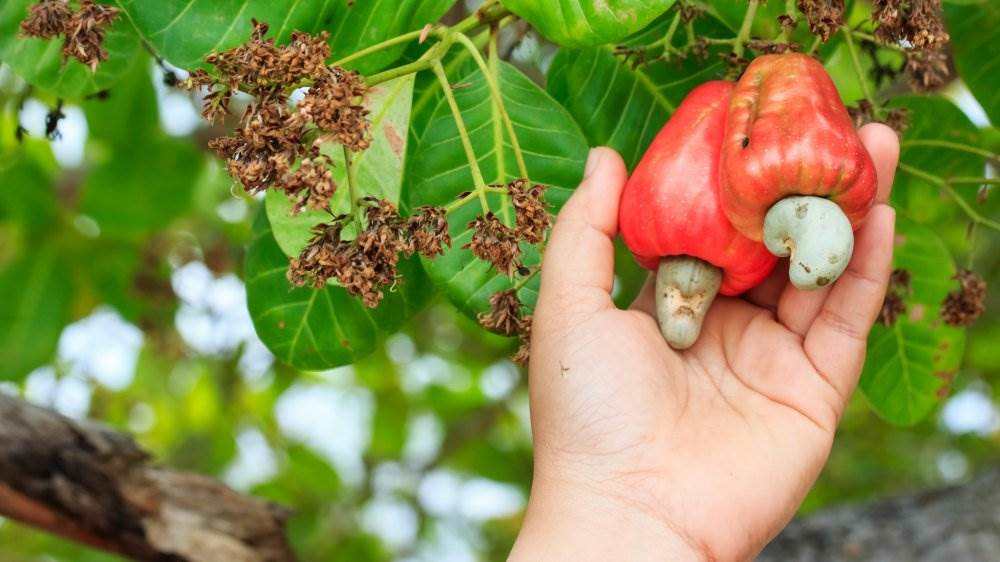Before we proceed further, let me inquire something: do you know if it is possible to eat a cashew fruit? Cashew nuts are well known and enjoyed by many; however, people rarely come across the fruit, or they simply do not recognize it. Despite the fact that this fruit is called ‘crunchy,’ it is hardly found in the stores, and its taste and texture may be quite unfamiliar to you.
The answer to the above question, which perhaps many of us might be wondering about Everyday Knowledge, is yes, it is possible to eat cashew fruit. It is rich in nutrients, and it plays several roles in the body, offering quite a number of benefits. However, it is always important to consider the downsides of taking these supplements. Some of them include the following: those people who may react allergic to the ingredients used in the making of these supplements may develop allergic reactions. At the same time, others with digestion problems may also worsen their health condition by taking supplements that harm their digestion system.
Do you want to learn more about the nutritional values contained in the cashew fruit, the benefits of eating the fruit, other uses of the tree and potential risks if consumed in large amounts? By continuing to read this article, learn everything you need to know about this exotic fruit!
Uncovering the History of Cashew Fruit Consumption
There has been the use of the cashew fruit only in certain areas of the world like Indonesia, Brazil and others for many years. However, the plant has not achieved significant success throughout the world today due to some of the following reasons; First, because the plant is restricted in many areas and secondly, because it requires time and effort to cultivate.
Historical Significance in Native Regions
- India: In India, cashew fruit is used to make beverages like Feni, a popular alcoholic drink.
- Brazil: In Brazil, the fruit is enjoyed fresh or processed into various products like juices and jams.
Global Spread and Limited Popularity
- Challenges in Cultivation: The difficulty in cultivating and transporting cashew fruit contributes to its limited global spread.
- Availability Issues: Its short shelf life and delicate nature make it less practical for widespread commercial sale.
Unusual Nutritional Properties of Cashew Fruit
Cashew fruit is packed with several healthy nutrients that include rich dietary fibre, vitamin A, vitamin C, vitamin E, vitamin K, vitamin B6, calcium, iron, magnesium, and phosphorus, among others. It also has substantial fat and protein contents, so people can consider it a four food group serving, when taken in small portions.
Vitamins and Minerals
- Dietary Fiber: Promotes healthy digestion.
- Vitamins A, C, E, K, and B6: Supports immune function, skin health, and overall wellness.
- Essential Minerals: Includes calcium, iron, magnesium, and phosphorus for bone and muscle health.
Fat and Protein Content
- Cashew fruit contains high levels of fat and protein, providing essential amino acids and energy.
Exploring the Health Benefits of Cashew Fruit
Cashew fruit is known for its anti-inflammatory and antioxidant belongings, which can help reduce the risk of chronic diseases. Its high fibre content aids in digestion, while its vitamins and minerals support overall health.
Anti-Inflammatory and Antioxidant Properties
- These properties help decrease the risk of diseases and protect the body from free radical damage.
Digestive Health Benefits
- High Fiber Content: Promotes healthy digestion and normal bowel movements.
Overall Nutritional Value
- The fruit’s vitamins and minerals support immune health, skin health, and general wellness.
Exploring the Potential Health Hazards of Cashew Fruit
However, like any other food, it has an associated health risk factor despite being rich in nutritional value. The skin has ingredients that can be considered toxic, and it is difficult for most people to extract the fatty and protein molecules that are present in the skin. However, people with cashew allergies or who are sensitive to the fruits should avoid it as it might cause allergic reactions.
Harmful Compounds in the Skin
- The skin of cashew fruit contains compounds that can irritate if not properly prepared.
Digestive Issues from High Fat and Protein Content
- Some people may experience digestive discomfort due to the fruit’s high fat and protein levels.
Allergic Reactions
- Identifying and Avoiding Allergens: Individuals with cashew allergies should avoid the fruit to prevent allergic reactions.
Exploring the Culinary Uses of Cashew Fruit
Cashew fruit can be consumed in various ways beyond eating it raw. It is often used to make beverages, jams, jellies, sauces, and even natural dyes. Its versatility makes it a valuable addition to any kitchen.
Common Ways to Consume Cashew Fruit
- Beverages: Used to make drinks like Feni.
- Jams and Jellies: Processed into sweet spreads.
- Sauces and Desserts: Added to enhance flavor.
Unique Culinary Recipes
- Traditional Dishes in Native Regions: Includes various local recipes that utilize the fruit.
Unveiling the Unusual Taste of Cashew Fruit
The taste of cashew fruit is a blend of sweet, sour, and slightly bitter flavours, often compared to apples, pears, or mangoes. Its texture is soft and juicy, with a slight crunch, making it a unique culinary experience.
Flavor Profile
- Comparisons to Other Fruits: Similar to apples, pears, and mangoes with a unique twist.
Texture Characteristics
- Eating Experience: Soft and juicy with a slight crunch, enhancing its appeal in various dishes.
Why Is Cashew Fruit Not Sold Widely?
The limited availability of cashew fruit in many regions is due to its short shelf life and the challenges of commercial cultivation. However, it can sometimes be found in speciality stores or markets in the tropical areas.
Short Shelf Life
- The fruit spoils quickly, making it hard to transport over long distances.
Transportation and Storage Challenges
- The delicate nature of cashew fruit requires careful handling and storage.
Market Availability
- Specialty Stores and Online Options: Sometimes available in niche markets or online.
Also Read About: The Rise of Cindovies: Blending Cinema and TV for a New Movie Experience
FAQ’s
Can you eat a cashew apple raw?
Despite being called a nut, cashew apple is actually a fruit, and its fruit can be eaten exactly as it is. Though its taste is quite acidic, it might cause some irritation in the mouth or at least a dry sensation to the people who decide to try it. The palatability of the fruit is normally blunted by cooking or processing the fruit to the recommended levels.
Can you eat cashew fruit raw?
Although the cashew fruit can be eaten fresh, it is normally used in cooking or prepared for creation into liquids, pastes, jams, sauces, etc. Due to the bitterness it contains, most people cannot stomach its taste, and thus is usually advisable to be taken when prepared with a view of softening the ingredient.
Why is cashew fruit not sold?
Cashew fruit is not easily marketed since it is relatively fresh and cannot be shipped intact for very long due to spoilage. Moreover, this fruit tends to have a soft texture that makes it sensitive to bruising, therefore not suitable for commerce like other hard fruits are.
Can you eat cashew fruit benefits?
Yes, cashew fruit offers numerous health benefits. It contains antioxidants, vitamins A, C, and E, diet fibre and is high in many other nutritional values. Some of the nutrients it possesses include vitamins that boost immunity, digestion, well-being, and skin health, to name but a few, thus succeeding as a good nutritional supplement.
Where to buy cashew fruit?
Cashew fruit can be bought from local stores that deal in organic foods and regional, or any supermarket that specializes in tropical or exotic fruits. Despite this, it is sometimes used in farmers’ markets, particularly in areas where the trees are grown. Online retailers may also offer cashew fruit seasonally.
Where do cashews grow?
Cashews are naturally grown in countries, especially countries in the tropical climatic zone of the world, such as Brazil, India, Vietnam and some African countries. These trees prefer warm and damp conditions and mostly occur in low-altitude areas with black clay or in regions with white river sandy loams.
Conclusion
Unfortunately, more people still have close to no information regarding cashew fruit, which is a delicious and healthy fruit at that. However, due to its shortage all over the world because of the technicality of producing it and the difficulties in transport, it proves to be very special in its medicinal values added to the extra taste. main nutrients such as vitamins and minerals, dietary fibre, and antioxidants in cashew fruit to promote health concerning digestion.
In the same context, it is essential to note some of the potential health risks, more so when the fruit is ingested raw, including allergies and digestive complications. Its usage in cooking in terms of drinks, garnishing and accompaniments like jams and sauces adds value to a human diet. As a novelty fruit to many people, it offers those who are lucky enough to come across it a new way of exploring the unique taste and health-enhancing qualities of this fruit. So next time you’re out shopping and come across a cashew fruit in the local gourmet supermarket, try to get some and add the cashew fruit to your diet plan.
For More Articles Click the: Ezinee.co.uk




